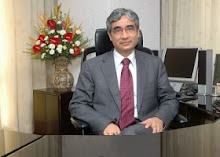One of the most tragicomic figures in Delhi is a senior civil servant who hangs on in the capital after retirement in the hope of wangling some government assignment or the other. A handful of these retired folk are lucky. They manage to land one job after another for years on end. The unlucky ones gravitate to the media where they turn into acerbic critics of the government which they have served with docile acquiescence for a greater part of their adult life.
But one also comes across civil servants who return to their hometowns and put their retirement to a more uplifting use. They write books, learn new skills, join local think tanks, engage in social work or, quite simply, develop interest in a new or unattended hobby. Singularly bereft of rancour and cynicism, they do not as a rule give vent to nostalgia about their years in harness.
Take the case of S K Sinha. He served the government of India for well over 30 years, rose to the rank of secretary in the cabinet secretariat and, within less than a month of his retirement in 2005, went back to his ancestral home in Patna. He had already made up his mind about what he would do next to keep himself busy. Nothing worried him more than the rural-urban and poor-rich divides in Bihar. They generated relentless social conflict in the state which, in turn, resulted in the growth of caste animosities, religious extremism and Naxalite violence.
Convinced that one could not rely on the state machinery alone to stem this violence, Sinha launched the Shoshit Seva Sangh (SSS) whose objective was to provide quality education to the poorest and most deprived community in Bihar the Mushars. These landless labourers, who lived in squalid ghettos, could not recall a day when they had two square meals or a respite from the abuse and blows heaped on them by upper-caste landlords.
The beginnings of the SSS were modest. Digging into his own savings, and with some contributions from friends and family members, he started an English-medium residential school in rented premises. It charged no fees and provided uniforms, toiletries, books, stationery and computers at no cost. But it recruited well-qualified teachers and paid them good salaries.
However, none of this impressed the Mushars at first. They could not imagine that the school in Patna would be any different from the village school with its absentee teachers, leaking roofs, lack of textbooks and, not least, pervasive caste discrimination. But within two years, their attitude had undergone a sea change. More than 750 children appeared for admission tests for the 50 seats for the pre-school and class I. Encouraged by the response, the SSS proceeded to rent more space, increase the number of classes to standard IX, recruit more teachers and expand dormitory and sports facilities. The teacher-student ratio was pegged at 1:17 better by far than in the most expensive private schools, let alone the government ones.
The journey of the SSS has not been an easy one though. Battered by centuries of poverty and discrimination, time and patience was needed to inculcate in the Mushars a sense of self-esteem. Only then could they develop the confidence that they would be able to acquire the knowledge and skills to face a competitive world.
None of this has deterred Sinha from expanding the scope of the project. Earlier this year the SSS purchased one acre of land in Patna to erect a school building. An agreement to purchase another acre adjacent to this one has been reached. The building work is expected to be completed by 2013 at a cost of Rs 5 crore. By and by the school will be able to house between 800-1,000 students.
Sinha hopes to collect funds from individuals and corporate groups that are convinced that his efforts are deserving of support. The achievements of the SSS so far are no more than a tiny step to bridge the rural-urban and rich-poor divide in Bihar. But for the Mushar children, who have been quick and eager to study, it is a giant leap forward in their quest for a life free of want and fear.
courtesy: TOI





No comments:
Post a Comment